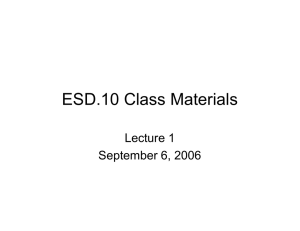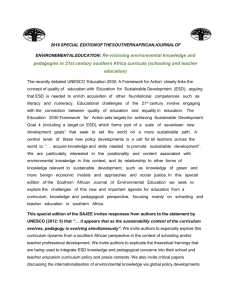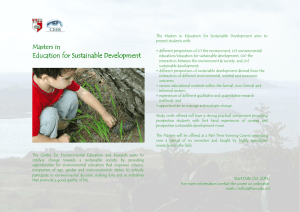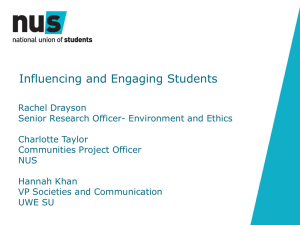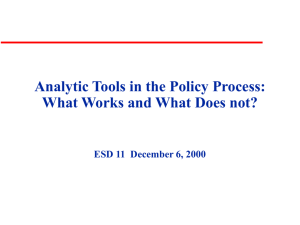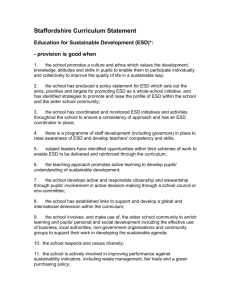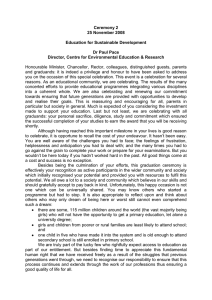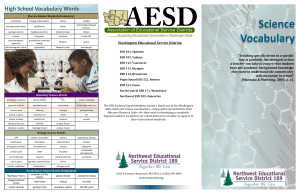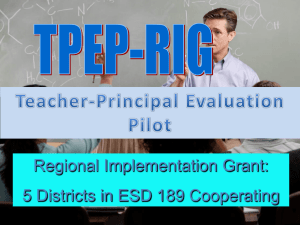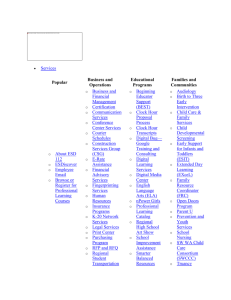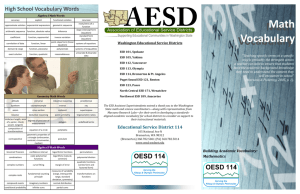Our biggest challenge in this new century is to take an idea that
advertisement
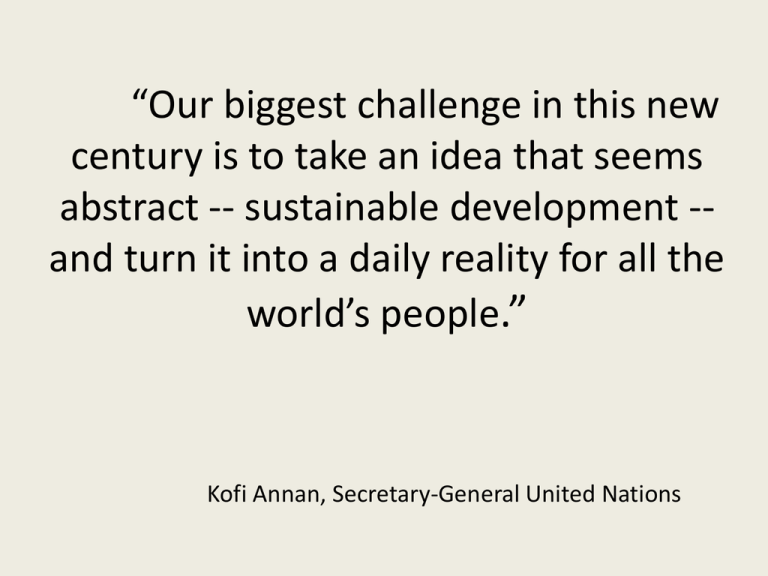
“Our biggest challenge in this new century is to take an idea that seems abstract -- sustainable development -and turn it into a daily reality for all the world’s people.” Kofi Annan, Secretary-General United Nations General Public Not Engaged Governments Industry General Population NGOs Academics The Power of SD Remains Dormant Locked in Isolated Issues AIDS Prevention Clean Air Safe Water Sustainable Consumption Poverty Eradication Climate Change Sustainable Development Rainforest Preservation Bio-diversity Population Growth Global Disjointed Approaches STEM Trade Barriers Tax policies Currency manipulation Towards Global Sustainability? Strong Global Warming Observed Hadley Centre for Climate Prediction and Research Based on Folland et al (2000) and Jones and Moberg (2003) Development at whose expense? Bonn Declaration – A Call for Action Encourage and enhance scientific excellence, research and new knowledge development for ESD through the involvement of higher education institutions and research networks in ESD. Mobilize the core functions of universities: teaching, research and community engagement to strengthen global and local knowledge of ESD, and utilize the UNESCO ESD Chairs and UNESCO program networks in this process. Why are HEI Addressing Sustainability? • • • • • • To better take advantage of globalization To help your institution compete To attract funding To create global citizens To make life better for others To infuse relevancy, meaning, etc., to better their ed. • To improve the life of all future generations Northern Problem As Well • • • • • • • • Hard to serve students suffer Preferred learning style other than reading Poverty related issues Irrelevant curricula Engaging the disenfranchised Home/family related issues Student/school conflict Narrowing the curriculum for testing Surface area Volume Square miles Cubic Miles 139,500,000 270,000 317,000,000 25,000 330,000 — 6,000,000 900,000 197,000,000 30,000 300 6,300,000 680,000 3,100 Percentage of Total Salt water • • The oceans Inland seas and saline lakes 97.2% 0.008% Fresh water • • • • • • • Freshwater lakes All rivers (average level) Antarctic Icecap Arctic Icecap and glaciers Water in the atmosphere Ground water within half a mile from surface — Deep-lying ground water Total (rounded) — 100.00 % — 1,000,000 1,000,000 326,000,000 0.009% 0.0001% 1.90% 0.21% 0.001% 0.31% 0.31% Understanding World’s Water Type Salt Water Fresh Water Antarctic Ground < 1/2 mile deep Ground > 1/2 mile deep Arctic Ice Caps Lakes Atmosphere Rivers Yards Feet Inches 95 0 7.53 5 8.41 11.16 11.16 7.56 .3240 .0360 .0036 A Perfect Storm … of Opportunities 10 Market Forces 5 Mega-Issues 5 Demanding Stakeholders Climate Change Green Consumers Pollution & Health Activist Shareholders Globalization Backlash Civil Society / NGOs Energy Crunch Government Regulators Erosion of Trust Financial Sectors Growth Revenue Competitive Advantage Business Value Preparing for the World of Work • • • • • Linking to TVET ESD for all Right to work Right to change the world of work Forming an international network of exploration • First meeting in Thailand in summer of 2007 I. Policy Level 1. Educational System Integration To Integration of TVET into Education System ——Articulation, mobility, career guidance ——Qualification Framework ——Collaboration with relevant industries/stakeholders ——Decent Work – salary ——Selection and hiring process of TVET teachers ——International Cooperation (faculty exchange) ——Vocationalization of the General Education The Sustainability “3-Legged Stool” Sustainable Development (SD) Corporate Responsibility (CR) Triple Bottom Line (TBL) Economy / Profits Sustainability Corporate Social Responsibility (CSR) 3Es / 3Ps Environment / Planet Sustainable business Eco-Efficiency Manufacturing efficiencies Profits Equity / People Ethical business Internal employees Taxes, R&D Operations efficiencies Human rights Jobs Product efficiencies Health & Safety Expenditures Smart design Empowerment Training Cradle-to-cradle, take-back Respect, Caring Fair trade Beyond compliance Local community Core values Restorative to nature Rest of the world Humanities in decline • We are in a major crisis of education. • Nations change educations for economic purposes, humanities are being cut back. (useful skills for short term profits) • Technology and engineering, applied science, emphasized. • Abilities crucial to democracy and more humane world not developed. • Old development model emphasizes GDP growth. But mere pursuit of growth does not necessarily improve other aspects of quality of life. • Critical thinking (philosophy), history, literature & arts is not very important in the education systems oriented towards economic growth. • Singapore good example. • Martha C. Nussbaum The Real Bottom Line! “We Need A World We Can Live In” At the global scale, there is only one bottom line: “Maintenance of the earth’s life support system for humans. If critical thresholds are crossed and the earth system shifts to another state much less amenable to human life, then everyday life as we know it –social systems, economics, politics – ceases to have meaning.” Uno Svedin – Swedish Research Council for the Environment, Agriculture Sciences and Spatial Planning Re-discovering Commerce Social entrepreneurship The arts Service to others? The Challenge for Education • Our greatest experiment-civilization itself-will succeed only if it can live on natures terms, not man’s. To do this we must adopt principles in which the short term is trumped by the long; in which caution prevails over ingenuity; in the which absurd myth of endless growth is replaced by respect for natural limits; in which progress is steered by precautionary wisdom. Ronald Wright-A Short History of Progress UNU Regional Centre of ESD Expertise Messengers Local Information Non Formal Formal Informal Sources Ngo’s Tertiary Media Regional/National Zoo/etc Secondary Peers Gov Agencies Elementary Society Private Sector Corp Training Preschool Life Exp. Research (HE, NGO) etc. Local Government Outcomes • Improved academic outcomes • More knowledgeable/supportive citizenry • More sustainably oriented production and consumption • Perhaps a shift in behaviour as learning is relevant and in scale etc.
